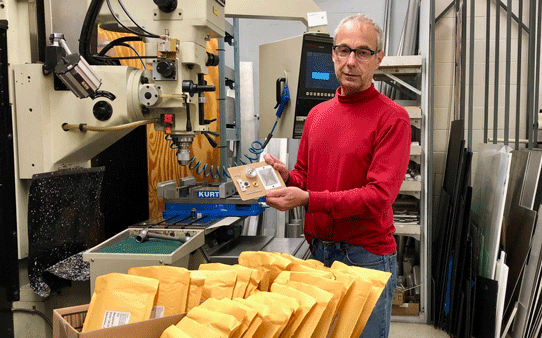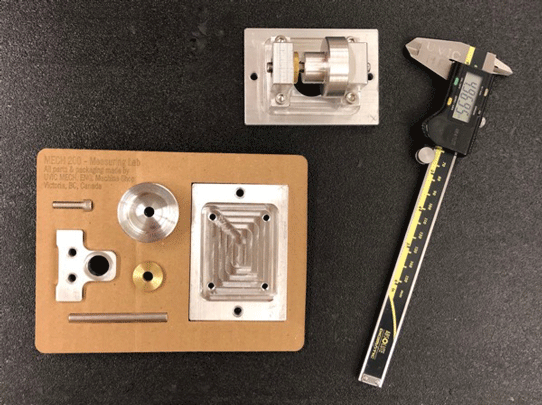Staff take the initiative in bringing online courses to life

Engineering Drawing has always been a popular course among mechanical engineering students at UVic because it’s usually their first experience in designing, manufacturing and testing a real device in a well-equipped machine shop.
This term, when the course commonly known as MECH 200 went online, Rodney Katz was determined to find a way to retain some its experiential elements.
Katz, a Senior Scientific Assistant who oversees the Mechanical Engineering Machining and Design Facility, has been instructing students in MECH 200 for 25 years. This month, with the help of three co-op students, Katz began manufacturing kits that will enable the 102 second-year students enrolled in the course to assemble, measure and test small devices in their own homes.

Each kit includes five custom-machined metal parts mounted on a laser-cut cardboard holder that, once assembled, will form a small rotor-type device. Students must use digital calipers to take extremely precise measurements of these parts – often in increments smaller than the width of a strand of hair – to ensure that the pieces fit together smoothly.
“I thought it was important that the students get a real sense of hands-on manufacturing and measuring,” said Katz. “It’s critical in engineering to be able to measure precisely and that’s what students will be challenged to do with these kits.”
Kits have already been mailed to 10 international students who live as far away as China, India, Indonesia and Turkey, as well as to a handful in the U.S. The next round of deliveries will be couriered to students across Canada while students in the Victoria area will pick up a kit at UVic in person.
MECH 200, a required course for all mechanical engineering students, introduces engineering drawing, computer-aided design (CAD) and machine shop practice. With undergraduate courses online this term, most of these fundamentals are being taught through live and recorded online lectures and labs.
Still, by having an actual device to practice on at home, students are getting real practice in crucial engineering principles such as dimensions, projections and tolerance.
Faculty’s staff step up during pandemic
Colin Bradley, the faculty’s associate dean research, said he’s been impressed by staff in Engineering and Computer Science who have taken the initiative in enriching online courses in inventive ways.
“Our staff are really stepping up to adapt to the COVID situation and making an awesome contribution,” said Bradley. “They’re preserving the hands-on component of some courses by moving experiential learning into students’ homes.”
Other examples of this type of innovation include:
- a fourth-year Mechatronics course, in which circuit boards and microcontrollers are being mailed to students for use in their homes;
- an Electrical and Computer Engineering class, in which second-year students were provided with remote access to an oscilloscope – an instrument that displays electrical signals;
- a fourth-year capstone course in which students sent their design specification for robotic vehicles to the machine shop team for manufacturing, and then assembled and tested them at home; and
- several courses in which a glass “lightboard,” created by Armando Tura, enables instructors to fully face students while working on calculations during online lectures, and also to show and manipulate any device set on a nearby table.
For Katz and the three co-op students developing and distributing 102 kits containing five custom-made pieces, the work for MECH 200 is worth the considerable effort.
“Instead of just displaying the process online, the students will get to manipulate the parts, learn how to handle digital calipers, and also understand aspects of precision measurement,” said Katz.
“This hands-on experience will give students a real-world understanding of the considerable effort that goes into making engineered products.”
